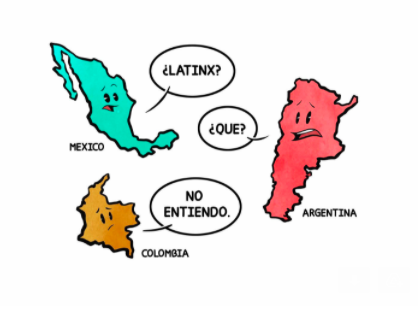
Lately, certain Americans have gained an obsession for “hyper inclusivity,” though perhaps “exclusive inclusivity” would be a better name. “Latinx” is a recently made-up term to identify the Latino community. Those who use it claim that the word promotes social justice. Although the non-Latinos who use the made-up word feel like they are being inclusive, the overarching majority of Latinos dislike the term.
The word “Latinx” was first seen around 2004, but did not gain any widespread usage until recently. The term claims to seek “gender inclusivity” by removing the gendered endings from Latina and Latino, two Latin words that have become part of the English language. While claiming to include those who identify as “nonbinary,” the unique Latin character of these immigrant words is extinguished and replaced with an Anglicized version. As of 2018, Latinx is used almost exclusively in the United States, and almost exclusively by non-Latinos.

Moreover, the word is not used widely in any Latin American country, and Latinos in the United States are not particularly fond of it, that is, if they are even aware of its existence. A study done by the Pew Research Center in August of 2020 showed that less than 25% of Latinos in the United States have heard of the invented word. Of those who have heard of Latinx, only 3% find the term acceptable. My Latin American family had never even heard of the invented term before we told them. Upon learning it, they all laughed, amazed at how seemingly educated people can use such a weird-looking and impossible to pronounce word. My mother, who was born and grew up in South America, adequately describes the word Latinx as a way of “putting people in a box”. To her, Latinx sounds like a joke.
What’s more, the usage of the word Latinx is a form of cultural imperialism. Certain Americans dislike the words Latino and Latina because such words do not conform with their ideas of gender. English is not a gendered language, and what we have is an effort to Americanize Latin languages. What we are left with is, essentially, an attempt to “fix” Latin languages by changing what has always been special about them. Many who oppose Latinx have also pointed out that this is not done for other ethnic groups: there are African Americans, Asian Americans, and Native Americans, yet Latinos are called “Latinx” rather than Latin Americans. In the words of Giancarlo Sopo, writing for USA Today, “Gender-nonconforming Americans should be treated with compassion and respect. If someone wants to be called Latinx, that is fine, but the label should not be forced upon all Latinos.”
By replacing our real words with invented words, people who promote Latinx take away our agency on which words to use, based on the ironic goal of “inclusivity,” when the term clearly isn’t inclusive of the vast majority of Latinos and Latinas. When one culture seeks to exterminate the other, language is almost always the first target.
Latinx is not welcomed by the majority of Latinos; it represents cultural linguistic imperialism by the Anglicizing of non-English words, and an unhealthy obsession with controlling how people speak. It is defended on the basis of inclusivity, but Latinos do not feel included when they hear it; rather, they feel confused. We must stop using Latinx; pretending it is a real word only makes us look ridiculous.







